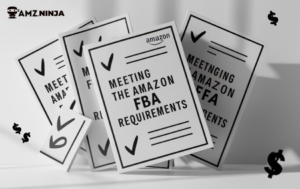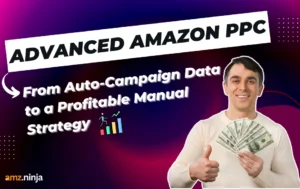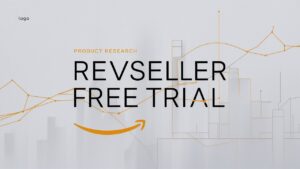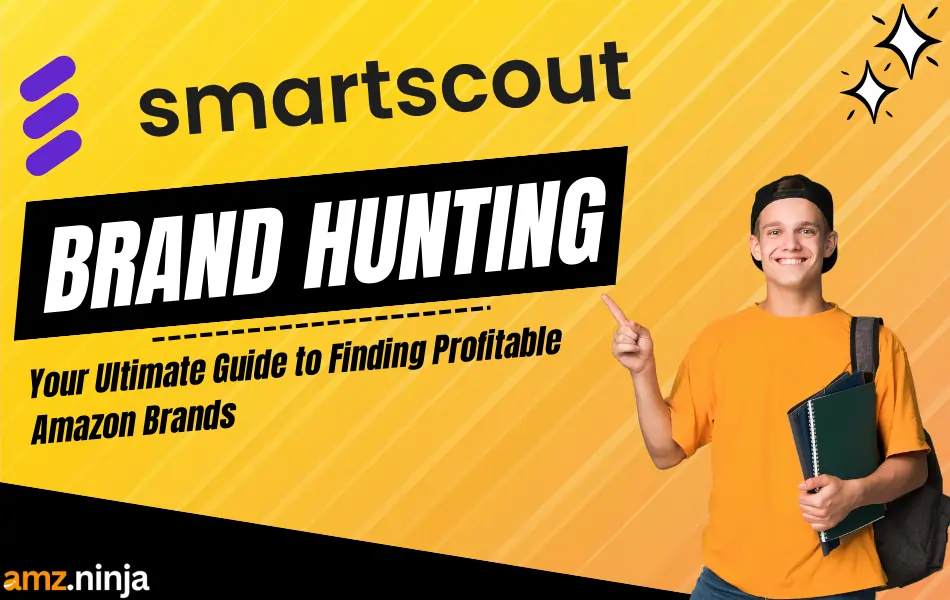
Tired of the endless scramble for profitable products? Fed up with a wholesale sourcing strategy that feels more like gambling than a real business? You’re not alone. Many Amazon FBA sellers are stuck in a cycle of chasing trending items, only to see their margins vaporised by a flood of new competitors.
There’s a better way to build a sustainable business, and it starts with shifting your focus from products to partners. This is the art of SmartScout brand hunting, a method that has completely changed how I source for my FBA business.
Instead of fighting for the Buy Box on yet another saturated listing, you can find established brands that are practically begging for a savvy seller to manage their Amazon presence. This guide will walk you through exactly how to use SmartScout to uncover these hidden wholesale gems.
I’ll show you the exact filters to apply, how to approach these brands, and how to build long-term, profitable relationships. Plus, you can grab an exclusive 25% discount on all SmartScout plans with my code: BLOGA25.
What Exactly Is Brand Hunting and Why Should You Care?
Let's get one thing straight: brand hunting is not about finding the next fidget spinner. It’s a strategic approach to identifying real, established brands already selling on Amazon that are open to working with third-party sellers.
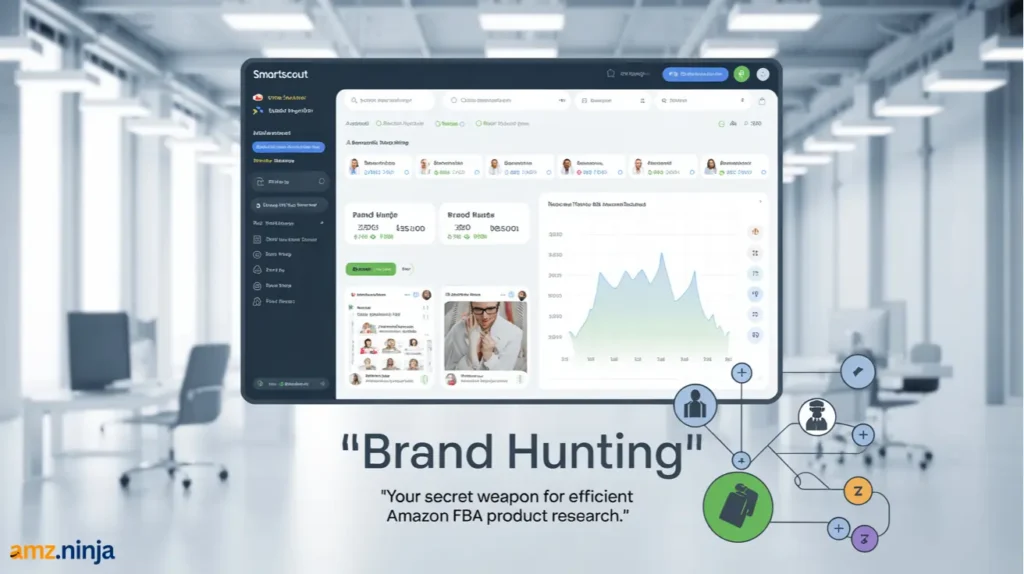
The goal isn’t a quick flip; it’s to secure stable, long-term supply chains for products with consistent demand. This method is a game-changer for both wholesale-focused sellers and those looking to work directly with brands.
A wholesale seller, for instance, might use brand hunting to find a fantastic kitchenware brand that's a hit in brick-and-mortar stores but has a weak, disorganised presence on Amazon. This signals a massive, untapped opportunity.
On the other hand, a brand-direct seller could search for brands with terrible product images, no A+ content, or listings clearly not enrolled in the Brand Registry. These are tell-tale signs of a brand that needs an expert partner to optimise its Amazon sales channel.
This is where SmartScout comes in. Instead of spending countless hours manually digging through Amazon's jungle of listings, SmartScout provides a searchable database of over 242,000 brands, complete with all the critical data you need.
It’s your secret weapon for efficient and effective Amazon FBA product research.

25% Exclusive Discount on SmartScout
exclusive
Use code BLOGA25 to get 25% OFF your first 3 months on any SmartScout plan. Perfect for Amazon India sellers looking to scale fast!
Save 25%
Key SmartScout Features for Brand Hunting Dominance
SmartScout is more than just a product research tool; it's designed from the ground up for brand-level analysis, giving you an edge that tools like Jungle Scout or Helium 10 can't quite match for this specific strategy.
- The Unrivaled Brands Database: This is the core of your brand-hunting mission. SmartScout gives you a top-down view of over 242,000 brands, letting you analyse key metrics like monthly revenue, average price, number of FBA sellers, and—crucially—how often Amazon itself is in stock on the listings.
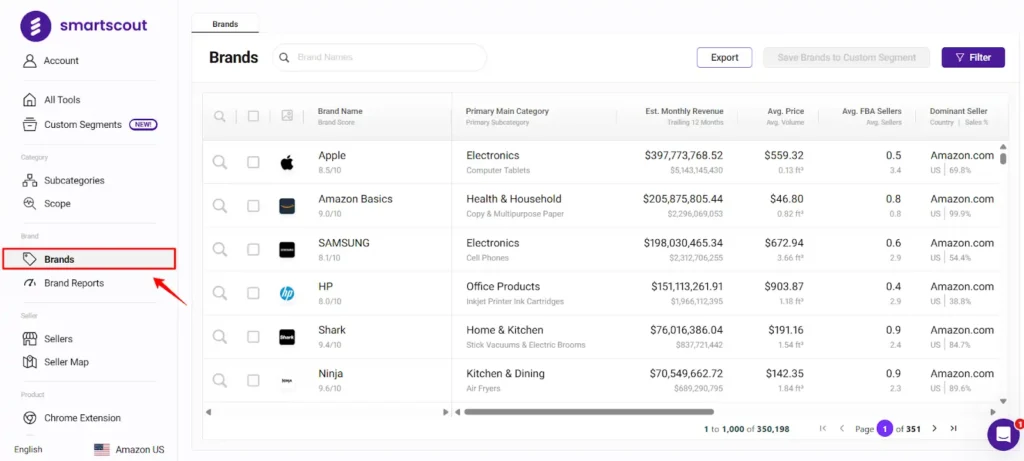
- Powerful and Precise Filters: Without filters, you'd be staring at a list dominated by giants like LEGO, Apple, or Nike—brands that are never going to partner with you. SmartScout’s filters are your targeting system.
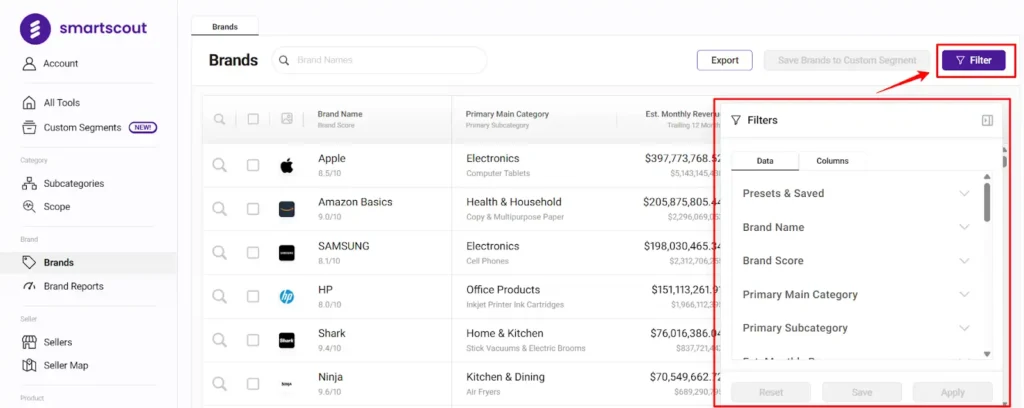
- Competitor Intelligence Tools: SmartScout offers unique tools like the Seller Map, which lets you see what other successful sellers are carrying. You can find sellers in your niche, analyse their storefronts, and reverse-engineer their success.
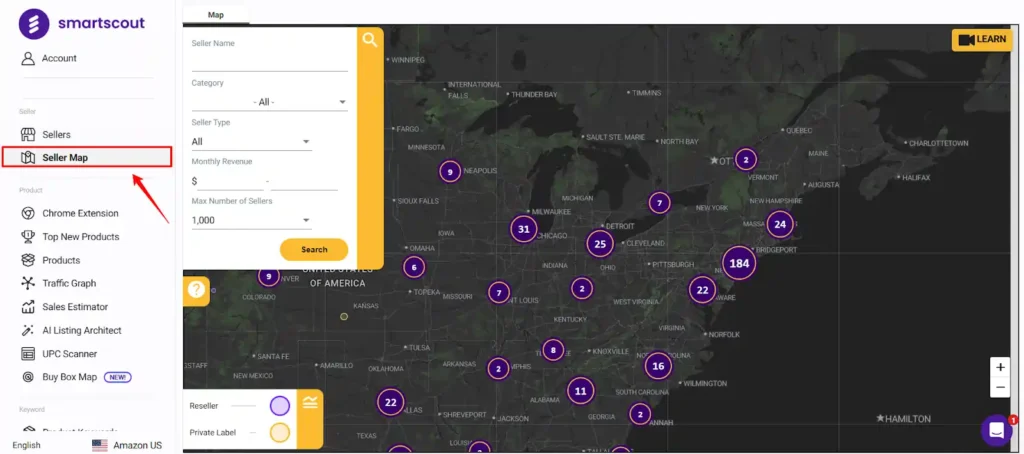
- AI-Powered Listing Optimisation: Once you land a partnership, you need to deliver value. SmartScout’s AI Listing Architect can help you craft highly optimised titles, bullet points, and descriptions using relevant keywords.
A Hands-On Walkthrough to Finding Brands with SmartScout
Alright, let's get down to the nitty-gritty. Here is the exact, step-by-step process I use to find winning brands with SmartScout.
Step 1: Get Your Filters Dialled In
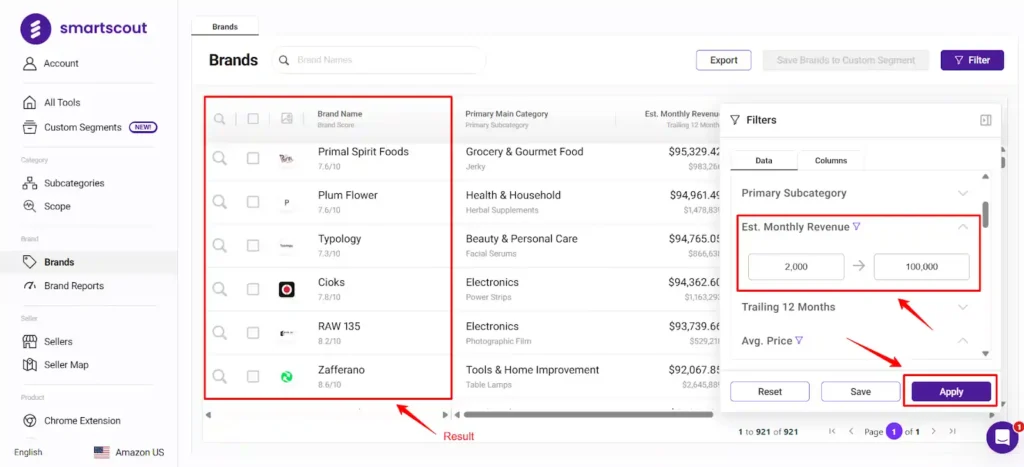
This is the most critical step. The right filters separate the high-potential needles from the haystack of untouchable brands. Head to the ‘Brands' tool in SmartScout and apply the following settings. This setup is designed to find established brands that have room for a new partner.
| Filter | Recommended Setting | Why This Setting Works |
|---|---|---|
| Amazon In-Stock Rate | Max 50% | This weeds out brands where Amazon acts as the primary seller. A lower rate means more Buy Box opportunities for you. |
| Dominant Seller Sales % | Max 50% | This filter avoids brands locked into an exclusive deal. If one seller has 80-90% of the sales, there's no room for you. |
| Average FBA Sellers | Min 3 | This indicates the brand is already comfortable working with multiple resellers and isn't hostile to the idea. |
| Monthly Revenue | $20,000–$100,000 | This targets the sweet spot: brands with proven demand but not so huge that they're impossible to contact. |
| Average Price | Min $25 | Filters out low-ticket items where profit margins are too thin to be worthwhile after FBA fees. |
| Average Rating | Min 3.5 Stars | Avoids products with quality issues while still leaving room for you to add value by improving listings and customer service. |
| Total Ratings | Min 10 | Ensures the product has at least some sales history and customer feedback, so you know it's not a complete dud. |
| Seller Country | United States (or your primary marketplace) | This helps you focus on domestic brands, which can simplify logistics and communication, especially when starting out. |
Step 2: Analyse Your Shortlist
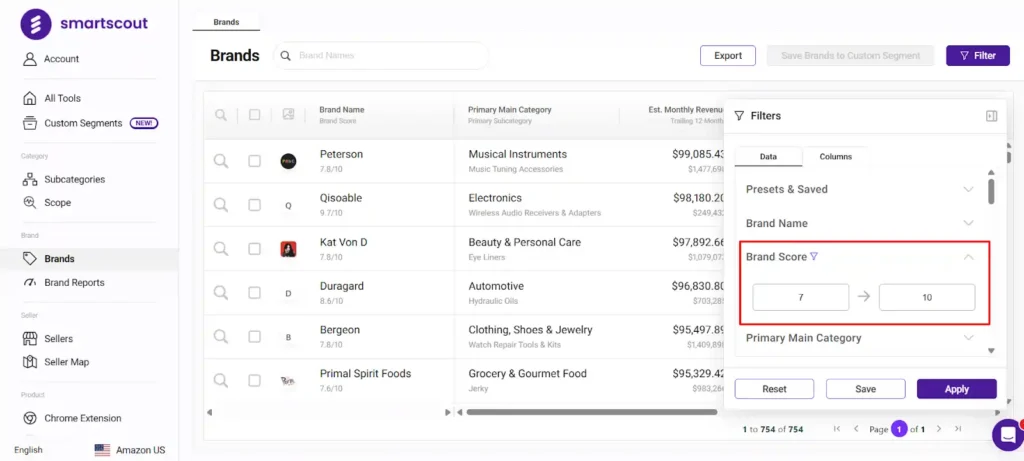
Once your filters are applied, SmartScout will present you with a curated list of brands. Now, it's time to dig deeper. Look for brands with a low Brand Score. This is a metric from 1-10 that SmartScout uses to rate how well a brand's listings are optimised.
A low score combined with decent revenue is a golden opportunity. It means the products are selling despite poor marketing, and you can come in and make a huge impact.
Click on a promising brand to explore its product catalogue. Are the images blurry? Is the copy full of typos? Is there no A+ content? These are all problems you can solve.
Step 3: Export and Organise Your Leads
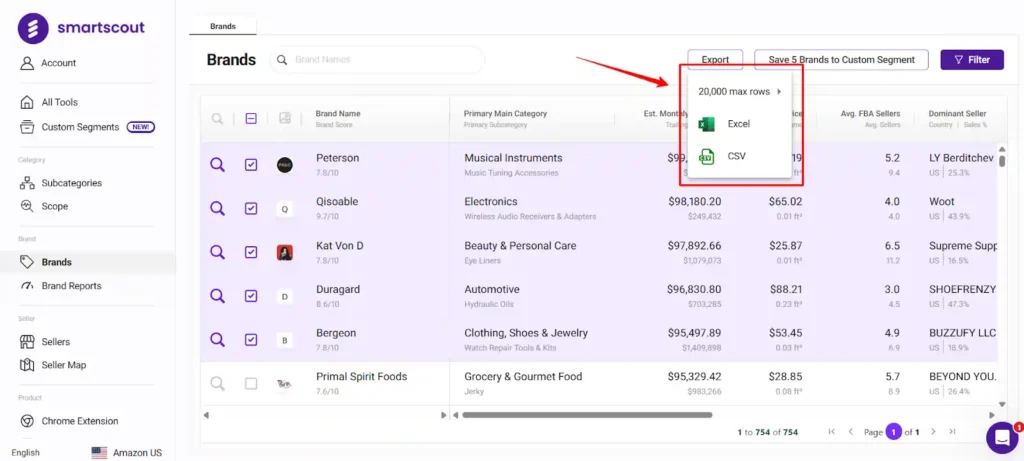
If you're on the Business plan or higher, you can export your filtered list to a .csv or .xlsx file. This is a massive time-saver. Open the file in Google Sheets or Excel and create your outreach pipeline. Add columns for:
This turns your research into an organised, actionable system for managing your wholesale leads.
Pro Seller Hacks for Next-Level Brand Hunting
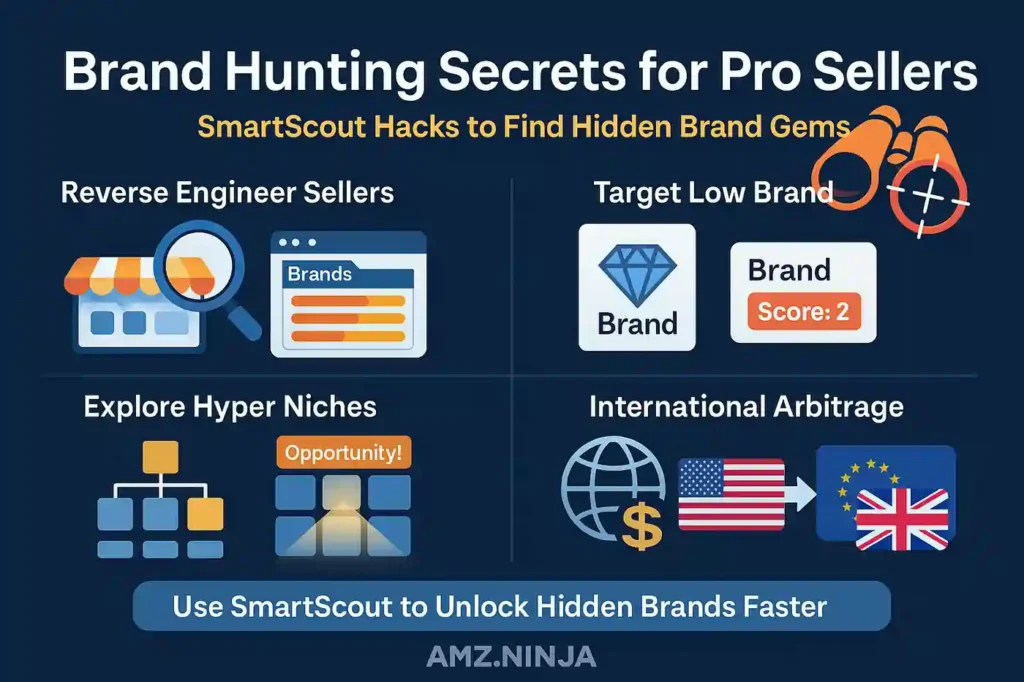
Want to get even more out of SmartScout? Here are a few pro tips I've picked up:
The Outreach Strategy That Gets Replies
Finding the brand is only half the battle. How you approach them is what separates the pros from the amateurs.
1. Find the Right Contact Information
Start with a simple Google search for “[Brand Name] wholesale program” or “contact”. If that fails, check the brand's official website footer. For smaller brands, LinkedIn is your best friend. Look for roles like “Sales Manager,” “Brand Manager,” or even the founder.
2. Craft the Perfect Pitch
Whatever you do, do not open your email with, “I am an Amazon seller and want to sell your products.” That’s the fastest way to get your email deleted. Instead, position yourself as an e-commerce partner or a brand growth specialist.
Your message should focus on their problems and how you can solve them. For example:
"Hi [Name], I'm an e-commerce specialist who helps brands like yours increase their sales and visibility on Amazon. I noticed that while your products have great reviews, there are some opportunities to optimise your listings to capture more traffic. I have a few ideas that could significantly boost your brand's presence and would love to share them with you."This approach frames you as a valuable partner, not just another reseller asking for a price list.
3. Handle the “No” Like a Pro
Often, a brand will reply saying they don't sell directly to resellers. Don't give up! This is a test. Your response should be:
“Thanks for the quick reply. I understand. Do you work with any authorised distributors that you could put me in touch with?”
Many brands prefer to work through distributors, and getting that contact information is a huge win.
Conclusion: Stop Chasing, Start Partnering
Successful, long-term Amazon FBA selling is about building a real business with stable foundations. The endless chase for the “hot” product is a recipe for burnout. SmartScout brand hunting offers a strategic, repeatable process for building a pipeline of profitable, long-term wholesale relationships. It allows you to move from being a reactive product hunter to a proactive business builder.
By using the filters and outreach strategies outlined in this guide, you can uncover brands that need your expertise and build partnerships that are profitable for years to come.



